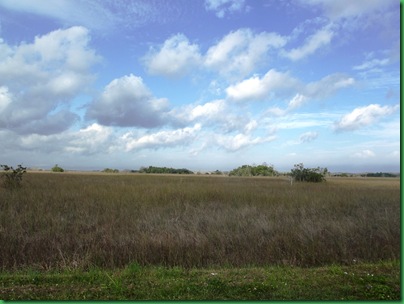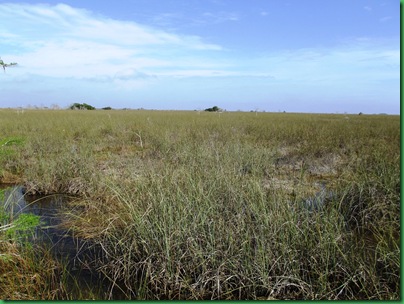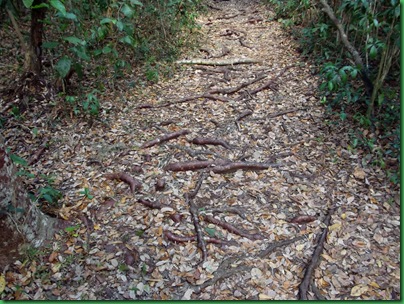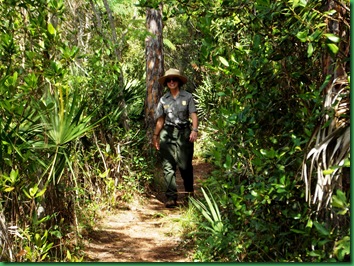Thursday February 14, 2013
Site T-15 Flamingo Campground
Everglades National Park
David has another marathon planned today.
Not a series of events but rather a series of hikes.
He wants to do the “car tour”, meaning drive up the Main Park Road and stop at every sign or walk or view that we have not already done.
While I love Florida’s state parks and have raved about them often, they can’t compare with a national park in terms of the many things to do some of which suit every visitor. There are short boardwalk hikes, there are medium 2-3 mile hikes, there are longer 7-12 mile hikes. There are a variety of paddles including the 99 mile Wilderness Trail which goes from Flamingo to Everglades City. It goes right through the middle of the Everglades, way back in where no one but those who paddle can go. It takes 9 or 10 days and you spend the night on chickees, raised platforms on the edge of the trail which is marked, of course, by those numbered markers. Boy oh boy would I love to do that. But in order to have enough gear, food and water for 10 days, I’d either have to take a canoe or get a bigger kayak I’m afraid. But a girl can dream!
Ok out of dreamland, back to the here and now.
Before I set out on this marathon day, I have to do my regular routine.
Go over to the shore of Florida Bay at dawn to catch the sunrise.
And then over to Eco Pond to see who has flown in today.
Now it’s time for the drive.
Highlights begin with the Mahogany Hammock an island on the edge of Shark River Slough.
We arrive at 9:00am. This will be important later.
The boardwalk bridges the sawgrass river and enters the tropical hammock which is on higher, dryer ground and has old growth mahogany hidden from historic logging. Those of you who know David is a tree man will not be surprised that this was the major event he wanted to see on this “tour”.
Although it looks long on this map, the boardwalk is only about 1/4 mile. Of course it takes us more than a quarter of an hour to do it.
;-))
We go through the saw grass prairie toward the tree island.
Yup BIG trees.
As we drive further along the Main Park Road, the river of grass is looking spectacular on this February day.
This forest is dwarf because of its high elevation.
:-)
The shallower water here, thin soil and therefore fewer nutrients, have stunted the cypress.
In the winter the bald cypress appear bare and lifeless but they are deciduous trees which have shed their leaves and will become green again in the spring. We think they look beautiful here and would love to see them in full leaf. But then the mosquitoes would be around as well. Can’t have one without the other it seems.
Pay-hay-okee is a Seminole word meaning ‘grassy waters’.
It is a second boardwalk trail just off the Main Park road. This is a prairie but a wet one. The Shark River Slough flows slowly toward the gulf. The slough is 8 miles wide here but shallow. A river of water. A river of grass. Most of the people who have lived here used boats as transportation and poled them rather than try to paddle.
An observation platform half way around this 2/10 mile trail enables us to see the Everglades wilderness the way the original Florida natives of this area, the Calusa, would have seen it. From the platform, you might see how wet or dry the land is, you might see the animals in the grasses.
Here is an aerial view of the boardwalk. The only difference between it and what we saw is that the view out to the grass is now obstructed by the hammock. Not sure why they went to the expense and labor of putting in a viewing platform if they did not want to top any of the trees.
The view isn’t totally obstructed but soon will be. They need an update to their aerial photo.
I stand on the bench to take this photo.
But look what else I see, this night heron out in the grasses. If they are supposed to be night birds, someone has forgotten to tell the ones in the Everglades. We see them almost every day. This picture is taken at 10:30am.
David is actually taking most of these pictures since it is his “tour” today. He really likes these dwarf cypress. They do look stunning standing alone in the multi-colored grasses.
The pictures we take from the boardwalk after the observation tower are actually better I think in giving a sense of the prairie.
The beauty of the prairie is very subtle.
I have to go slowly and look carefully to see all that it has to offer, like this White Peacock Butterfly.
Even in winter the Prairie has its beautiful morning glory and yellow swamp flower.
Moving on up the road, we come to a different habitat, the Pinelands Trail
This is one of the most varied habitats in the park. The surrounding sawgrass prairie is a single habitat with hammocks. This pine island has many habitats from cactus on the high ground to the jungle around the edge.
These pinelands have no fixed borders. Fires and hurricanes shift them.
I notice the wonderful pine scent the minute I hit the trail. Taking deep breaths, I fill my lungs with it over and over.
The wildflowers are numerous here. Yellow seems to be a favorite color.
These pines are tall and thin and smell magnificent.
Wish I could just put this one outside my rig at every campsite. Yes Paul this is a one armed tree hug.
Along the side of the trail are “solution” holes. They would make walking off trail in these really flat pinelands a bit treacherous since you could easily step in one unawares and injure yourself. The limestone rock under these lands dissolves in the acids from rain and tannic waters creating these holes. While dangerous for us, they are microenvironments for aquatic plants and animals. Also, they are an important water source for animals during the dry seasons. They would definitely be difficult to see if you were just moseying around out here without a trail.
These slash pine trees once occupied all the high ground of the Atlantic coastal ridge from Miami deep into the Everglades.
But this was prime real estate for development and now only 20,000 acres of pineland community are left of the unique area that once occupied 10 times this area. This is the most endangered pine community in the U.S.
Seems like they could have come up with a nicer name than slash.
I think it is a beautiful habitat and it smells heavenly.
It is now 12:03pm. One more stop before lunch.
This is the half mile Three-in-one Trail located adjacent to the northern campground, Long Pine Key.
We are on a hunt for the rare and getting rarer Linguus tree snails.
Formerly 52 color variety of Linguus tree snails graced the hammocks of South Florida. They came from the West Indies dispersed and settled in separate tree islands. After years of inbreeding they formed the many multi colored varieties of today.
During the dry season the snails sleep half their lives away. They seal themselves tight to a tree trunk and estivate – a type of hibernation. Breaking the seal by removing the snail, kills the snail. They are most active during the rainy season when they graze on the lichens of smooth barked trees
The snails are hermaphrodites, bisexual and after mating both are fertilized and can lay eggs.
If all of that isn’t amazing enough, here is the really unbelievable part. Collectors, of course caring nothing about the snail itself, after gathering many of one variety resulting in their deaths, sometimes burned the hammock destroying any snails left in order to make their collection more valuable. Thus the Linguus tree snail is very endangered.
Is there anything people won’t do for money?
So far, we have had no luck in spotting the beautiful snail.
They are said to be in Mahogany Hammock and in the Pinelands. We looked but don’t find any. This trail is our final possibility. The snails are often high up and usually on the underside of branches out of any possibility of sun.
As we are walking slowly along and trying to look up while watching our footsteps on this many rooted trail, along comes a ranger with no group. She stops and we ask her for some help here. She gives us some clues and on we go looking up and watching our steps
David spies one!!
Do you see it? I didn’t either. I was already past it when he called me back.
So he zooms up. See it now?
If not, how about now?
WOW!!
MY TURN!!
It’s way over my head but much easier to see than the one David found. No doubt he would have seen it if he’d been first down the trail.
We hunt for the snail spotter tie breaker to no avail and are soon at the end of the trail at Long Pine Key Lake. Some of the Long Pine Key campground sites are on the opposite shore.
We drive through this very popular campground. I guess we have no pictures of it because it is David’s camera day and he is driving the car. My fault – sorry.
Like most of the Flamingo campground it has no hook ups and cold showers. The sites are large with nice spacing. The campground is midway between the two upper end visitor’s centers and in a great location for seeing the top half of the park.
We see many rigs with solar panels. It appears folks who come here really love it and are all set up for the boondocking required. Had I done a better planning job, we would have spent a few days here before going down to Flamingo although the Flamingo area is still my favorite.
It is now 1:00 pm, our day is only half finished and we are famished.
But this post is long so check back for Part II of the Marathon Trail-Drive.

























































I have learned sooooo much. What an awesome post with all the info and pictures! The snails are so unique, the thought of collectors using fire to increase the value of their collection turns my stomach, the " solution" holes are interesting, I can smell the pines, and the wildflowers are so pretty.
ReplyDeleteWaiting for part 2........
Beautiful snails ! Glad you found them..... The birds were pretty this morning too. Now that it is getting light earlier I am finding I am waking up earlier too. Such excitement each new day brings.
ReplyDeleteReally good stuff about the Everglades, make me feel so lazy sitting here poolside about 20 miles from you(Rock Creek Rv Resort) Naples but do enjoy your read every night.....
ReplyDeleteWith all that beauty and amazing things you see, it's a wonder you ever complete a hike. Thank heavens digital cameras can take tons of pictures! And we enjoy every one you put on your blog.
ReplyDeleteSo glad you posted your one armed tree hugging picture, you have incredible talent, for sure! Bet the tree appreciated the love. :cD
That pink bird at the begining was so beautiful
ReplyDeleteGood for you guys spying those snails! The colors on them are so pretty!
ReplyDeleteBeautiful sunrise picture!! Those are neat pink spoonbills!! And snails in trees? You showed us, it must be true!!! :)
ReplyDeleteI've never heard of that kind of snail. The shell is like some kind of sea creature. Love the pictures.
ReplyDeleteThanks for giving us such an amazing tour of the area. We've talked about going down to Flamingo Cg every time we're coming/going from the Keys, but I never could find out much info about it...and it's such a LONG way!
ReplyDeleteWe saw a flock of Night Heron's at Kissimmee Prairie during the day time too. They were grumpy and not cooperative to photograph, so maybe they were trying to sleep!
It's nice to see David having enough energy to do all the hiking and exploring that you do.
Very cool snail
ReplyDeleteHow very interesting about the snails. I'm glad you found a couple for us to see. With all the pictures you include in your posts, I'm amazed that you get them to publish. You must have super strong internet.
ReplyDeleteGreat info about the snails ... I had no idea.
ReplyDeleteHard to pick the most fun part of your day ... I'd say your morning ritual is just the bomb! look at that sunrise! and checking to see who flew in... haha love it... and well filling your lungs with that pine forest air... indeed ... ahhhhh
ReplyDeleteLOVE the snail stuff! haha... you kids! beautiful! really interesting.
"Is there anything people won’t do for money?" .... killing the snails ... I tell ya... the rat bastards of this planet...
Spotting rare snails - how fun and how pretty they are :) You saw all manner of natural wonders - birds, big trees, dwarf trees, wet prairie, dry prairie, snails...my oh my! The good life!! Thanks for all the info about the snails..how sad - I never knew...so many people never know...
ReplyDelete